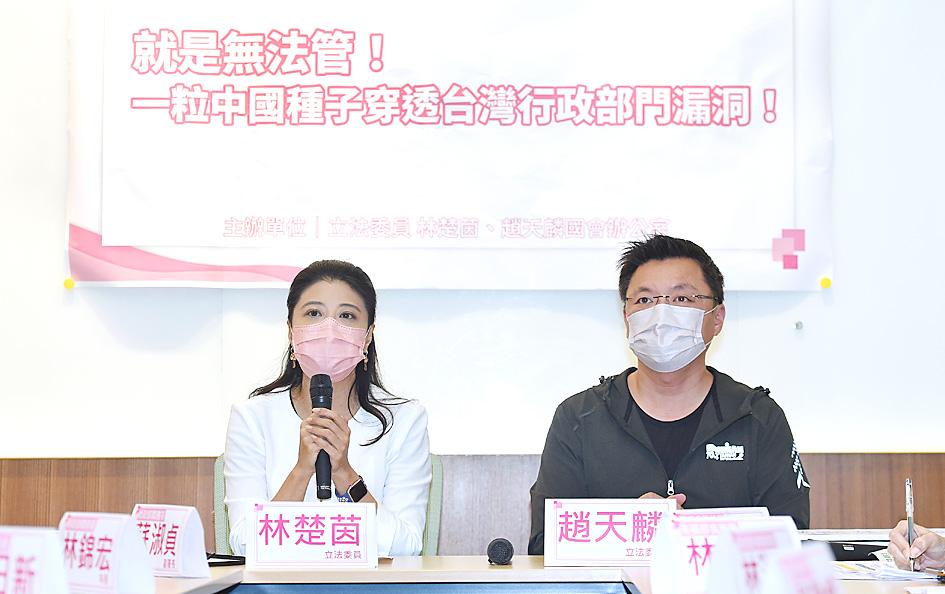Legislators yesterday urged the government to investigate and seize seeds that were imported from China and illegally sold in Taiwan through Facebook groups.
Democratic Progressive Party (DPP) legislators Michelle Lin (林楚茵) and Chao Tien-lin (趙天麟) at a news conference at the Legislative Yuan in Taipei warned about the risks the seeds pose to national safety and agriculture.
Lin said that she received a report in April that someone on Facebook was selling pepino melon seeds of unknown origin, and claiming that the seeds can prevent and heal cancer, as well as reduce blood pressure and blood sugar levels.

Photo: Liao Chen-hui, Taipei Times
Another Facebook seller was offering black tomato seeds, which the seller claimed lowered the risk of men developing prostate cancer and heart disease, she said, adding that current regulations do not prevent such sales.
There is no law prohibitng claims that seeds, as opposed to food, could have curative effects, Lin said.
The Food and Drug Administration (FDA) would not halt the Facebook sales, as it questioned whether seeds could be counted as food, she said.
Lin said her colleagues inquired about the seeds and purchased them, which were falsely registered as “decorations” by the sellers.
Chao said that the sellers ignored regulations on marketing, importing, packaging and logistics to illegally sell products that were sent by untraceable companies.
“Thousands of people place orders every day, and no seller has been caught,” Chao quoted a seller as allegedly saying.
Customs officers should easily be able to discern seeds and plants from “decorations” as they appear orange in X-ray scanners, he said.
He proposed using dogs, which were helpful in detecting African swine fever, to identify illegal plants.
He also asked how the products already being imported can be traced.
Bureau of Animal and Plant Health Inspection and Quarantine Deputy Director-General Chou Hui-chuan (鄒慧娟) said that seeds should be registered and pass inspection before being imported.
The agency would investigate and handle reports of any seeds of unknown origins entering the country and ask that Facebook sales be halted, Chou said.
FDA Deputy Director Lin Chin-fu (林金富) said that food advertisements must not include misinformation or exaggerations, or claims to have curative effects.
People who make false advertising claims can face a fine of NT$40,000 to NT$4 million (US$1,355 to US$135,474), while those who claim food products have curative effects could face a fine ranging from NT$600,000 to NT$5 million, he said.
Although seeds are not fruit, the same penalties apply to fruit that grow from the seeds, he added.
Customs Administration Deputy Director-General Su Shu-chen (蘇淑貞) said that abnormalities detected in imported goods are examined at customs, adding that seeds and plants are sent to the Bureau of Animal and Plant Health Inspection and Quarantine for further inspection.

Taiwan has received more than US$70 million in royalties as of the end of last year from developing the F-16V jet as countries worldwide purchase or upgrade to this popular model, government and military officials said on Saturday. Taiwan funded the development of the F-16V jet and ended up the sole investor as other countries withdrew from the program. Now the F-16V is increasingly popular and countries must pay Taiwan a percentage in royalties when they purchase new F-16V aircraft or upgrade older F-16 models. The next five years are expected to be the peak for these royalties, with Taiwan potentially earning

POSITIVE DEVELOPMENT: Japan and the US are expected to hold in-depth discussions on Taiwan-related issues during the meeting next month, Japanese sources said The holding of a Japan-US leaders’ meeting ahead of US President Donald Trump’s visit to China is positive news for Taiwan, former Japan-Taiwan Exchange Association representative Hiroyasu Izumi said yesterday. After the Liberal Democratic Party’s landslide victory in Japan’s House of Representatives election, Japanese Prime Minister Sanae Takaichi is scheduled to visit the US next month, where she is to meet with Trump ahead of the US president’s planned visit to China from March 31 to April 2 for a meeting with Chinese President Xi Jinping (習近平). Japan and the US are expected to hold in-depth discussions on Taiwan-related issues during the

‘LIKE-MINDED PARTNER’: Tako van Popta said it would be inappropriate to delay signing the deal with Taiwan because of China, adding he would promote the issue Canadian senators have stressed Taiwan’s importance for international trade and expressed enthusiasm for ensuring the Taiwan-Canada trade cooperation framework agreement is implemented this year. Representative to Canada Harry Tseng (曾厚仁) in an interview with the Central News Agency (CNA) said he was increasingly uneasy about Ottawa’s delays in signing the agreement, especially as Ottawa has warmed toward Beijing. There are “no negotiations left. Not only [is it] initialed, we have three versions of the text ready: English, French and Mandarin,” Tseng said. “That tells you how close we are to the final signature.” Tseng said that he hoped Canadian Prime Minister Mark Carney

STAY IN YOUR LANE: As the US and Israel attack Iran, the ministry has warned China not to overstep by including Taiwanese citizens in its evacuation orders The Ministry of Foreign Affairs (MOFA) yesterday rebuked a statement by China’s embassy in Israel that it would evacuate Taiwanese holders of Chinese travel documents from Israel amid the latter’s escalating conflict with Iran. Tensions have risen across the Middle East in the wake of US and Israeli airstrikes on Iran beginning Saturday. China subsequently issued an evacuation notice for its citizens. In a news release, the Chinese embassy in Israel said holders of “Taiwan compatriot permits (台胞證)” issued to Taiwanese nationals by Chinese authorities for travel to China — could register for evacuation to Egypt. In Taipei, the ministry yesterday said Taiwan